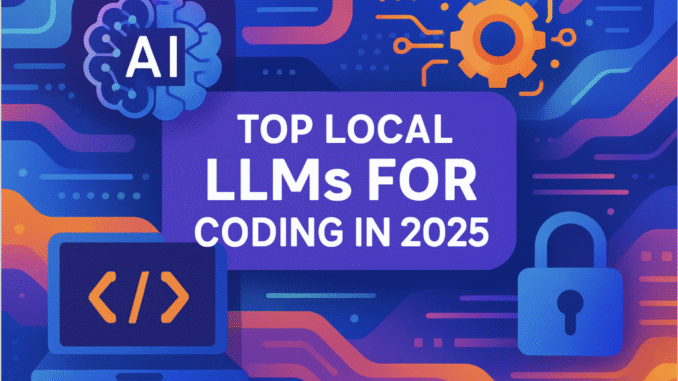
Local large language models (LLMs) for coding have become highly capable, allowing developers to work with advanced code-generation and assistance tools entirely offline. This article reviews the top local LLMs for coding as of mid-2025, highlights key model features, and discusses tools to make local deployment accessible.
Why Choose a Local LLM for Coding?
Running LLMs locally offers:
Enhanced privacy (no code leaves your device).
Offline capability (work anywhere, anytime).
Zero recurring costs (once you’ve set up your hardware).
Customizable performance and integration—tune your experience to your device and workflow.
Leading Local LLMs for Coding (2025)
Other Notable Models for Local Code Generation
Llama 3: Versatile for both code and general text; 8B or 70B parameter versions available.
GLM-4-32B: Noted for high coding performance, especially in code analysis.
aiXcoder: Easy to run, lightweight, ideal for code completion in Python/Java.
Hardware Considerations
High-end models (Code Llama 70B, DeepSeek-Coder 20B+): Need 40GB or more VRAM at full precision; ~12–24GB possible with quantization, trading some performance.
Mid-tier models (StarCoder2 variants, Qwen 2.5 14B): Can run on GPUs with 12–24GB VRAM.
Lightweight models (Phi-3 Mini, small StarCoder2): Can run on entry-level GPUs or even some laptops with 4–8GB VRAM.
Quantized formats like GGUF and GPTQ enable large models to run on less powerful hardware with moderate accuracy loss.
Local Deployment Tools For Coding LLMs
Ollama: Command-line and lightweight GUI tool letting you run popular code models with one-line commands.
LM Studio: User-friendly GUI for macOS and Windows, great for managing and chatting with coding models.
Nut Studio: Simplifies setup for beginners by auto-detecting hardware and downloading compatible, offline models.
Llama.cpp: Core engine powering many local model runners; extremely fast and cross-platform.
text-generation-webui, Faraday.dev, local.ai: Advanced platforms providing rich web GUIs, APIs, and development frameworks.
What Can Local LLMs Do in Coding?
Generate functions, classes, or entire modules from natural language.
Provide context-aware autocompletions and “continue coding” suggestions.
Inspect, debug, and explain code snippets.
Generate documentation, perform code reviews, and suggest refactoring.
Integrate into IDEs or stand-alone editors mimicking cloud AI coding assistants without sending code externally.
Summary Table
Conclusion
Local LLM coding assistants have matured significantly by 2025, presenting viable alternatives to cloud-only AI. Leading models like Code Llama 70B, DeepSeek-Coder, StarCoder2, Qwen 2.5 Coder, and Phi-3 Mini cover a wide spectrum of hardware needs and coding workloads.
Tools such as Ollama, Nut Studio, and LM Studio help developers at all levels to efficiently deploy and utilize these models offline with ease. Whether you prioritize privacy, cost, or raw performance, local LLMs are now a practical, powerful part of the coding toolkit.
Asif Razzaq is the CEO of Marktechpost Media Inc.. As a visionary entrepreneur and engineer, Asif is committed to harnessing the potential of Artificial Intelligence for social good. His most recent endeavor is the launch of an Artificial Intelligence Media Platform, Marktechpost, which stands out for its in-depth coverage of machine learning and deep learning news that is both technically sound and easily understandable by a wide audience. The platform boasts of over 2 million monthly views, illustrating its popularity among audiences.






Be the first to comment